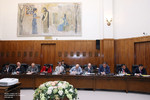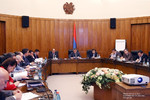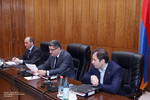Saturday, 20 April 2013
NCFA Board Meeting Reviews Armenia’s Economic Development Trends, ANCF Programs
Chaired by Prime Minister Tigran Sargsyan, the Board of Trustees of Armenia’s National Competitiveness Fund held a regular meeting in Office of Government.
After discussing the minutes of the last meeting and approving the agenda of today’s meeting, Prime Minister Tigran Sargsyan presented the economic results recorded in the first quarter of this year and in 2012.
Economic performance was said to have been on the upgrade in the first three months of 2013. In particular, the economic activity index was 8.7%, with the GDP standing at 11.7%. Compared to the same period of 2012, industry grew by 15.8%, agriculture - 2.3% and the tertiary sector - about 7%.
“Against a background of negative trade balance, exports tended up nearly three times as faster as imports. This was mainly due to the new export-oriented industrial strategy. We will push ahead with this policy line as we can see that our strategy is taking effect. By using its whole growth toolkit - credit funds, State guarantees and tax benefits – the State will continue to prop up the private sector with a focus on jobs and exports. The government has already approved 20 such programs. This year’s State budget was estimated implying a 6.2% growth index. Note that revenue proved AMD7bn up in the first quarter of 2013,” Tigran Sargsyan said.
The head of government reminded that FY2012 was completed with a 7.2% economic growth. According to the Prime Minister, the structure of the growth is particularly important as industry and agriculture boasted the largest share in the GDP, with a 9.3% rise recorded in agriculture and 14.5% in industry last year. A 48% growth was achieved in the field of water supply, recycling and waste management. The tertiary sector’s growth breakdown is as follows: wholesale and retail trade - 6%, transport – 14%, financial and insurance activities – 23%.
Construction was said to have broken even in 2012. The Prime Minister reminded that starting 2009 the main decline in the economy - 43% - was recorded in this very sector.
“In the following period as well, construction was the main deterrent force of the economy. Nevertheless, we were able to bring it to a breakeven point in 2012 and expect that the building sector will resume recovery to nurture economic growth this year,” Tigran Sargsyan added.
Macroeconomic performance was sufficiently good in 2012: budget deficit did not exceed the mark of 3%, inflation was within the planned target of 4%, and external debt was 37%, which is within the permitted threshold of external debt.
Coming to the future programs, Tigran Sargsyan stressed the need for continued improvement of the business environment. He reminded that according to the World Bank’s Doing Business report, Armenia has improved its position by 18 points ranking 32nd among 185 countries. The head of government said work will continue in this direction.
The Prime Minister next spoke about the reforms and programs implemented in the social, healthcare, inspection sectors and other areas.
In conclusion, the Board discussed and approved the auditor’s report on the Fund’s annual financial statement for 2012.











